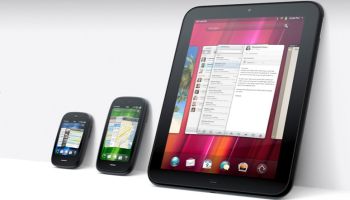

Hewlett-Packard has held a meeting to consider the fate of its webOS operating system, according to The Verge.
As suggested by a Reuters report, the sale of webOS to another company is on the table: “Several technology companies have expressed an interest in buying the division, which is seen as attractive for its patents.” That report, citing four unnamed sources “close to the matter”, listed Oracle as a possible contender for the webOS assets.
HP acquired webOS as part of its $1.2 billion acquisition of Palm in 2010. Its first tablet with the operating system, the TouchPad, met with some critical praise but anaemic sales upon its July release in the United States.
Analysts and the market reacted poorly to his decisions, though, and quickly forced him out in favour of HP’s current CEO Meg Whitman.
Whitman made the decision to keep PSG under the company’s roof. “HP objectively evaluated the strategic, financial and operational impact of spinning off PSG,” she wrote in a statement on 27 October, ahead of the conference call. “It’s clear after our analysis that keeping PSG within HP is right for customers and partners, right for shareholders, and right for employees.”
During a conference call on 27 October, she suggested that HP would remain in the tablet business – in partnership with Microsoft. “We’re certainly going to be there with Windows 8,” she said, “and we’re going to make a long-term decision about webOS.”
Due sometime in 2012, Windows 8 will pair the “traditional” Windows desktop with another user interface based on a colourful set of tiles, with easy switching between the two. The tile-centric interface is meant to operate on tablets, which in turn will allow Microsoft to finally compete against Apple’s iPad in that segment.
If HP decides to sell webOS, it might not be able to recoup the entire $1.2 billion it originally shelled out for Palm. In theory, it could also license the software to other companies for their own devices. It also could shut down the unit entirely, and keep the patents. Whatever the scenario, chances are pretty good that webOS will not be HP’s problem much longer.
All Cybertrucks manufactured between November 2023 and February 2025 recalled over trim that can fall…
As Musk guts US federal agencies, SEC issues summons over Elon's failure to disclose ownership…
Moonshot project Taara spun out of Google, uses lasers and not satellites to provide internet…
Pebble creator launches two new PebbleOS-based smartwatches with 30-day battery life, e-ink screens after OS…
Amazon loses appeal in Luxembourg's administrative court over 746m euro GDPR fine related to use…
Nvidia, xAI to participate in project backed by BlackRock, Microsoft to invest $100bn in AI…